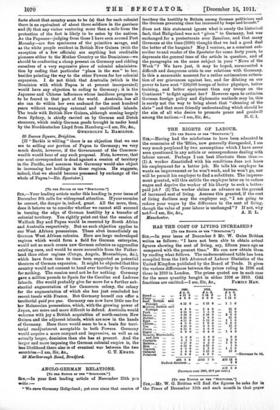THE RIGHTS OF LABOUR.
pro TBZ EDITOR OF TSR "SPECTATOR.")
SIR,—Haying had the misfortune to have been educated in the economics of the 'fifties, now generally disregarded, I am very much perplexed by two assumptions which I have never seen questioned in any article or correspondence dealing with labour unrest. Perhaps I can best illustrate them thus :— (1) A worker dissatisfied with his conditions does not leave his employment for a better job. He tells his employer he wants an improvement or be won't work, and he won't go, nor will he permit his employer to find a substitute. The improve- ment granted, will this entitle the employer later on to reduce wages and deprive the worker of his liberty to seek a better- paid job ? (2) The worker claims an advance on the ground of increased cost of living. Assume this granted, if the cost of living declines may the employer say, "I am going to reduce your wages by the difference in the cost of living, though the value of your labour is unchanged" ? If not, why


















































 Previous page
Previous page